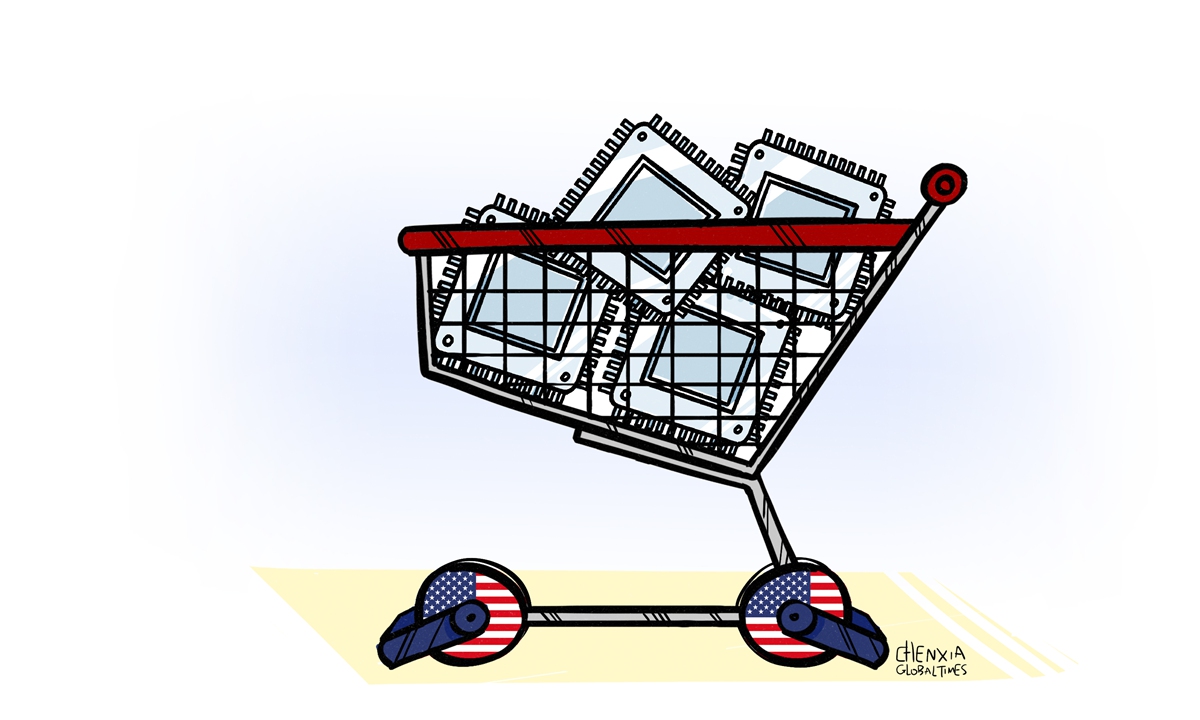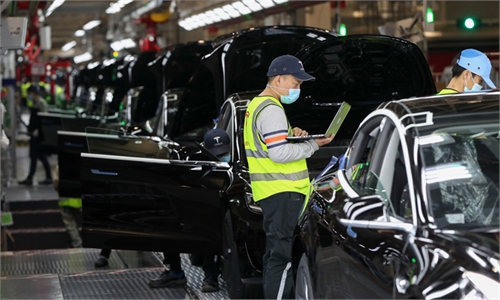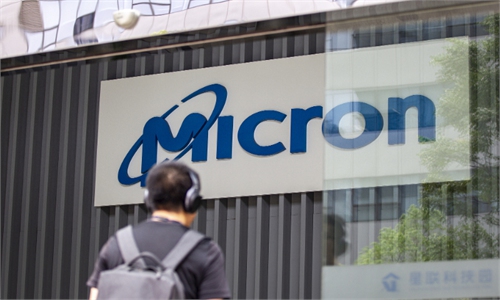
Illustration: Chen Xia/Global Times
Despite the US' technology "decoupling" push, Pat Gelsinger, CEO of Intel, the long-term leading US semiconductor giant, has traveled to China this week. During his trip, Gelsinger highlighted the importance of the Chinese market for the US chip manufacturer, saying China is one of Intel's most important markets.On Wednesday, Chinese Vice President Han Zheng met with Gelsinger. According to Xinhua, Han said "Intel is welcome to stand committed to the Chinese market and contribute to promoting China-US economic and trade cooperation and maintaining the stability of global industrial and supply chains." Han's words explicitly demonstrate China's sincerity.
As the US' ill-intentioned chip war against China escalates, Washington is using technology "decoupling" as a weapon in its geopolitical strategy to contain and suppress China, pursuing political wealth at the expense of US high-tech companies like Intel, but the Chinese side, in stark contrast, has always been committed to fostering a market-oriented and law-based business environment with sincerity, welcoming high-tech companies from the US and elsewhere to invest and continue to share the dividends of China's economic growth.
In 2022, Washington issued an order barring US companies from supplying semiconductor chips, chipmaking devices, and updates for past sales to Chinese companies. The US-initiated chip war against China has seriously disrupted the global supply chain established over the past decades, locking semiconductor makers, especially US chip manufacturers, in a maze that they are eager to find the exit, although this will not be easy. China is one of the largest purchasers of semiconductors in the world. US semiconductor companies like Intel cannot afford a failure in the Chinese market.
Intel is a major American semiconductor manufacturer. While many have been focusing on the Biden administration's effort to revitalize chip-making in the US, and pinning much hope on Intel to achieve this goal, less attention has been paid to the fact that the Chinese market is of great importance for Intel's survival. Intel earned 27 percent of its 2022 revenue from China, according to media reports. It can be seen that China is now a vital overseas market for the US semiconductor giant. Amid intense competition in the semiconductor sector, if Intel wants to maintain its global competitiveness and continually expand its production capacity, whether it be at home or abroad, the number one premise for business is that it must guarantee stable operation and cash flow in its major markets, but, regrettably, politicians in Washington don't understand the basic logic of business.
The US' unilateral sanctions and its technology "decoupling" push have greatly disrupted the global supply chain. Moreover, the US' ill-intentioned chip war against China, as well as its abuse of tariffs, has exacerbated the problem as it causes serious harm to US high-tech companies that see China as a major market. The raft of measures, which aims to limit China's access to high-tech chips, has built a maze trapping US high-tech companies in red tape. On the one hand, due to Washington's export restrictions, some US companies have realized that they don't know how to deal with China and share the dividend of China's economic growth. It seems that they have been trapped in a maze, unable to find an exit. On the other hand, US companies have also been pressured due to the Biden administration's emphasis on revitalization of US manufacturing, which requests them to increase investment in the US.
Now, amid global economic gloom, US companies are searching for sustainable ways to find new revenue. Amid the US' technology "decoupling" push, Gelsinger's China trip can perhaps provide some useful reference points. Gelsinger was quoted by media reports as saying that China "is one of the world's largest markets, and also one of Intel's most important markets." Intel's emphasis on the Chinese market can perhaps allow the US high-tech companies to find the exit and reduce the adverse effects triggered by the US' ill-intentioned chip war.
China welcomes US high-tech companies to invest in the country and continue to share China's development dividends. The country will open wider to the outside world, and is committed to creating a market-oriented, law-based international business environment where domestic and foreign enterprises are treated equally and protection of intellectual property is given priority to. We hope more US companies can see the market potential of China and get out of the maze built by the US-initiated chip war.
The author is a reporter with the Global Times. bizopinion@globaltimes.com.cn



